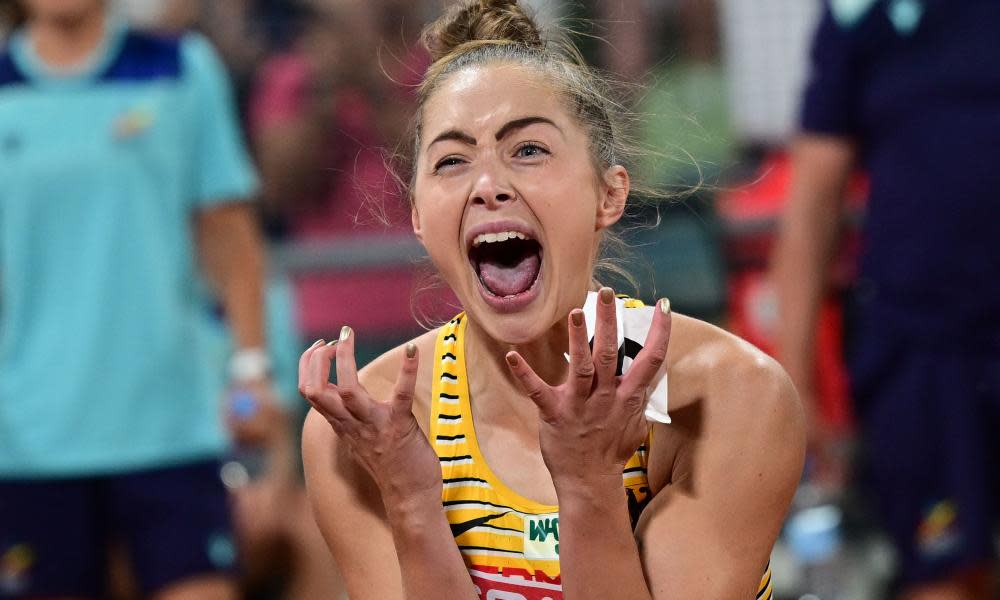Lückenkemper and Jacobs take 100m golds as Asher-Smith pulls up in final

It was supposed to be a shootout for the ages, with the two fastest female British sprinters in history going toe-to-toe with pride, bragging rights, and a European 100m gold medal on the line. But on a wild and intoxicating night in Munich, Dina Asher-Smith pulled up with cramp and then her compatriot Daryll Neita blamed the same problem for robbing her of glory. It was staggering, discombobulating, and – frankly – very, very weird.
Asher-Smith admitted afterwards she had never had cramp in her life. Meanwhile Neita insisted that she had been so worried about an injury that she said a silent prayer. But as they shook their heads and licked their wounds, the huge 45,000 crowd in the Olympic Stadium got the miracle they craved as home favourite Gina Lückenkemper got up on the line to take a shock gold in 10.99sec.
Related: Eilish McColgan’s golden template falls short in European 10,000m
It all made for an extraordinary night. But just not the one anyone in the British contingent had envisioned. Neita at least took a bronze medal in 11 sec flat, just behind Switzerland’s Mujinga Kambundji, who claimed silver. But she had really wanted gold, and after blitzing her semi-final in 10.95 she had looked primed to get it.
“When I was setting up my blocks for the final, I had the worst cramp I have ever had in my life,” Neita explained later. “I was looking for my coach to say I don’t think I can run. But after missing out on a final at worlds and not doing my best performance in the Commonwealths, I didn’t want to miss this final. So I rolled the dice.
“I was saying a prayer – God, just get me through this. Honestly I could feel my whole right leg cramping up and I didn’t want to hurt anything. So I chilled through that race. I honestly do not know how I got a medal. But the gold should have been mine and it wasn’t.”
Meanwhile Asher-Smith, who had come to Munich to defend her title despite suffering a hamstring injury last month, confirmed there was no serious damage and that she would go again in the 200m. “It was very irritated, very tight,” she said. “I wasn’t about to go and run a whole race on two cramping calves and possibly tear them. It’s just very annoying.”
There was better news for Britain in the men’s 100m as Zharnel Hughes took silver and Jeremiah Azu bronze behind the Italian Olympic champion Marcell Jacobs.
The race was always going to boil down to a simple equation: was Jacobs back to full fitness after withdrawing from the worlds in Eugene? If he was, then he would win gold. Anything less, though, would open the door.
Victory in his semi-final showed Jacobs remained the man to beat. And in the final the Italian had enough to hold off the fast finishing Hughes as he came home in 9.95, 0.04 clear of the Briton. “I was closing with every step,” insisted Hughes. “But it has been a tough season and to come out here and deliver, I am very proud of myself.”
Azu, meanwhile, was rightly delighted with a medal and a personal best of 10.13. “I saw first come up, I saw second come up and I said ‘surely I have done enough to get third?’” he said. “And I was waiting and waiting and I saw my name and just screamed.”

However there was disappointment for Jacob Fincham-Dukes, who was demoted to fifth place in the long jump after appearing to take silver. It came after an appeal from France, which led to his best jump of 8.06m being voided due to his toe crossing the line. Olympic champion Miltos Tentoglou of Greece took gold in a championship best 8.52m.
Earlier in the evening a packed stadium also roared its approval as the former world decathlon champion Niklas Kaul staged a dramatic late comeback with a 76m javelin throw and fast 1500m to win another home gold with 8,545 points, 77 ahead of Switzerland’s Simon Ehammer.
However Croatia’s Sandra Perkovic denied Germany a third gold of the night in the women’s discus by defeating Germany’s Kristin Pudenz by eight centimetres – and in doing so became the first athlete in European championships history to win six individual titles.
A night of high class athletics also saw the Norwegian 5,000m world champion Jakob Ingebrigtsen defend his European crown with another display of breezy brilliance. After a choppy race, Ingebrigtsen blitzed the field with a last lap of 53 seconds to take gold in 13.21.13

 Yahoo News
Yahoo News 
